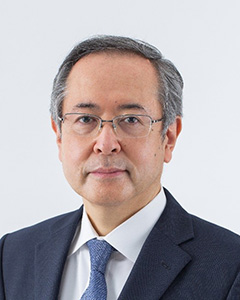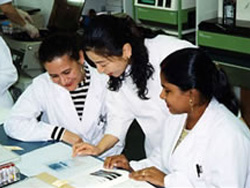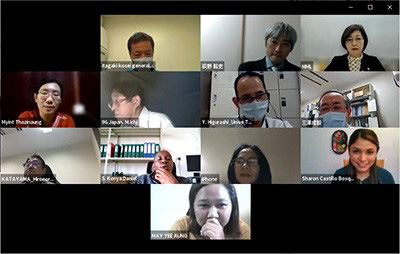Medical Technology Training
Course in Clinical Laboratory Technology: Clinical Microbiology for Emerging and Reemerging Infectious Diseases

Shigeki Misawa, JIMTEF Course Leader
Senior Associate Professor, Department of Clinical Laboratory Technology, Faculty of Medical Science, Juntendo University
35 years of experience in the development of clinical laboratory technologies for infectious disease control in developing countries
- I. Introduction
-
Infectious disease control remains a critical issue in developing countries. Since its founding, JIMTEF has positioned microbiology testing, a set of clinical laboratory techniques necessary for the diagnosis of infectious diseases, as the primary focus of its training programs; beginning in 1988 and continuing to the present day, JIMTEF has been commissioned by the Japan International Cooperation Agency (JICA).
The Course in Clinical Laboratory Technology: Clinical Microbiology for Emerging and Reemerging Infectious Diseases is based at JICA Tokyo, with training provided at medical institutions, laboratories, research institutions and companies in Tokyo and neighboring prefectures. This course features unique content that enables participants to (1) acquire knowledge and skills in standard and evidence-based microbiology testing, (2) learn how to manage testing in accordance with ISO 15189, and (3) learn methods for building relationships with physicians and other laboratories. The precise content of the course is reviewed annually in order to respond to advances in laboratory technology and changes in infectious diseases; it is also tailored to meet local needs. In recent years, advanced molecular diagnostic techniques have been incorporated into the course in response to the rise in antimicrobial resistance and the prevalence of viral infections.
A total of 371 professionals involved in microbiology testing from 88 countries have completed this course; across all of the clinical laboratory technology training programs offered by JIMTEF, a total of 471 trainees from 89 countries have completed their respective programs.
Trainees who have returned to their home countries serve as leaders who head the microbiology testing departments of their home institutions, transferring the knowledge and skills they acquired in Japan to their home countries to promote the improvement and development of testing.
The fight against infectious diseases will persist into the future. Through this training program, the Japan International Medical Technology Foundation will continue striving to contribute to the improvement of medical care in developing countries.

Breakdown of trainees who have completed this course
Asia: 94 trainees from 19 countrie
Africa: 150 trainees from 29 countries
Central and South America: 62 trainees from 19 countries
Oceania: 45 trainees from 11 countries
Middle East: 16 trainees from 6 countries
Europe: 4 trainees from 4 countries
Total: 371 trainees from 88 countries - II. Course objectives
-
This training course aims to equip participants with skills and knowledge in microbiology testing, a set of clinical laboratory techniques essential to the appropriate diagnosis and treatment of infectious diseases. It goes without saying that modern medicine cannot function without clinical laboratory testing, and the provision of high-quality microbiology test information is of the utmost importance in diagnosing and treating infectious diseases. The objectives of this new training course are therefore to instruct participants in the standard testing methods necessary for high-quality and consistent testing, laboratory-testing quality management, and the management and operation of microbiology laboratories, including their role in hospital infection control. Accordingly, trainees should be persons in charge of practical operations at key medical institutions or laboratories in their home countries, and we select individuals who will be able to smoothly execute the transfer of technology after returning to their home countries.
For 2021, 11 trainees from Gabon, Iran, Kenya, Nigeria, Samoa, Sri Lanka, and Timor-Leste were accepted.
For 2022, 8 trainees from Kenya, Zambia, Sierra Leone, Nigeria, Panama, and Timor-Leste were accepted.
For 2023, 7 trainees from Indonesia, Tunisia, Kenya, Zambia, Nigeria, Guinea, and Madagascar were accepted.
For 2024, 7 trainees from Uganda, Guinea, Samoa, Zambia, Sierra Leone, Nigeria, and Papua New Guinea were accepted.
For 2025, 9 trainees from Guinea, Kenya, Samoa, Zambia, Sierra Leone, Nigeria, Vanuatu, Papua New Guinea, and Bhutan will be accepted. - III. Eligibility requirements
-
Persons employed at a microbiology laboratory that is able to cooperate with a national or regional core medical institution or diagnostic department, who are technicians, physicians, pharmacists or nurses engaged in microbiology testing, and who hold a position of responsibility that will enable dissemination of the skills and knowledge acquired through the training program
Persons who possess the English language skills necessary for participation in the training program
Persons who possess basic PC skills, including the use of Microsoft Office software
Persons who are physically and mentally healthy and able to participate in the training program without hindrance
Persons not in military service
- IV. Course description
-
The contents of the course are as shown in the table. The course consists of two main components: lectures and practical training (practical training on microbiology testing techniques and hospital training). During the practical training on microbiology testing techniques, trainees will receive practical training in good microbiological techniques, Gram staining, biochemical characterization, and drug susceptibility testing. During the hospital training, trainees will experience and confirm the knowledge acquired from the lectures and group practical training, while also receiving practical training in the training of laboratory staff and the collection and provision of microbiology test information necessary for infection control. Trainees will also practice creating standard operating procedures and performing quality control in accordance with ISO 15189, the international standard for genetic testing and clinical laboratories. JICA also offers a program in which trainees conduct lectures on cooperation in the field of healthcare and the role of clinical testing in healthcare systems.
Lectures Biosafety and biosecurity in microbiology testing, equipment layout and usage precautions in microbiology laboratories, major infectious disease pathogens, test selection and interpretation, global trends in infectious diseases (antimicrobial resistance, COVID-19), management of microbiology testing (pre-test processes, post-test processes), building relationships with physicians and other institutions, role of microbiology laboratories in infection control (including nosocomial infections), microbiology testing for empiric therapy (smear testing of patient specimens for infectious disease diagnosis), smear testing of female reproductive organs, specimen-specific testing methods (blood, cerebrospinal fluid, respiratory tract specimens, stool, and urine), testing methods for drug susceptibility, testing methods for drug resistance, SARS-CoV-2 molecular diagnostic testing reagents and equipment, SARS-CoV-2 antigen and antibody testing reagents and equipment, testing methods for anaerobic bacteria, basic epidemiological statistics, creation of standard operating procedures (SOPs), internal quality control for microbiology testing, staff education Practical training on microbiology testing techniques Good microbiological techniques, Gram staining, biochemical characterization, drug susceptibility testing Hospital training Understanding the current state of microbiology testing in Japan and confirming what was learned in training Practical training on cleaning and sterilization Sakura Seiki Co., Ltd. Education Center Workshops Management of microbiology testing (pre-test processes, post-test processes), building relationships with physicians and other institutions, basic epidemiological statistics, microbiology testing for empiric therapy (smear testing of patient specimens for infectious disease diagnosis), smear testing of female reproductive organs, internal quality control for microbiology testing, staff education, creation of standard operating procedures (SOPs) Study tours Sysmex Corporation
Roche Diagnostics K.K.
BioMérieux Japan Ltd.
MicroSKY Lab, Inc.
Nippon Becton Dickinson Co., Ltd.Presentations Job reports, training debriefing Other JIMTEF orientation, health checkup(s), JICA-provided healthcare-related programs,
evaluation meeting, completion ceremony

Training in the laboratory of a teaching hospital

Online follow-up training
Practical training host institutions in Japan
- Center Hospital of the National Center for Global Health and Medicine
- Tokyo Medical Center
- Saiseikai Yokohamashi Tobu Hospital
- Saiseikai Kawaguchi General Hospital
- Sakura Seiki Co., Ltd.
- Juntendo University Hospital
- Institute of Science Tokyo Hospital
- The University of Tokyo Hospital
- Tokyo Saiseikai Central Hospital
- Nippon Medical School Tamanagayama Hospital
- Nihon University Itabashi Hospital
- MicroSKY Lab, Inc.
(in gojūon order)
List of medical institutions and training facilities that have hosted foreign trainees
- V. Conclusion
-
Infectious disease control has become a common issue not just among developing countries but across the globe, and was taken up as a major agenda item at the G7 Ise-Shima Summit held in May 2016.
Furthermore, in recent years, controlling the transmission of COVID-19, which has spread throughout the world, has become a major global issue.
With these issues in mind, we have further enhanced the existing course content and have made our training course more comprehensive through the inclusion of such topics as PCR testing methods, genetic testing methods, and antibody testing methods.


